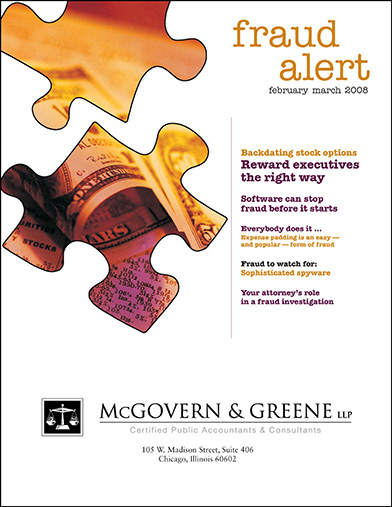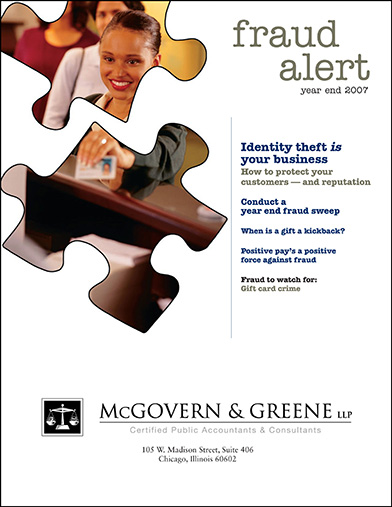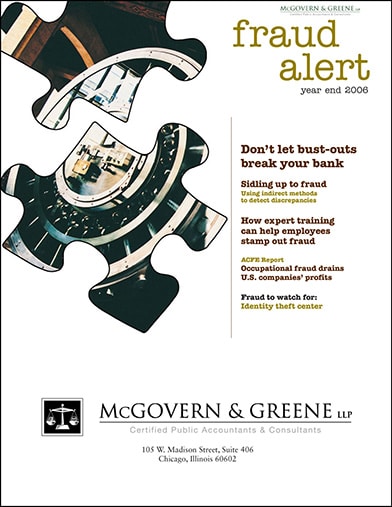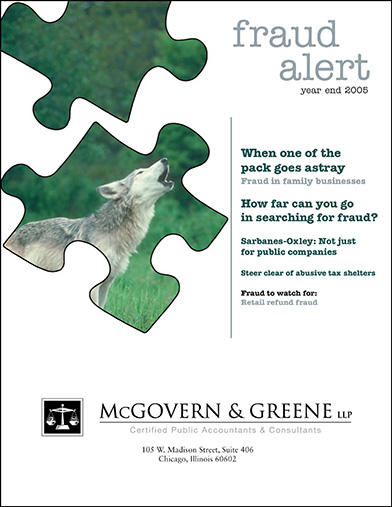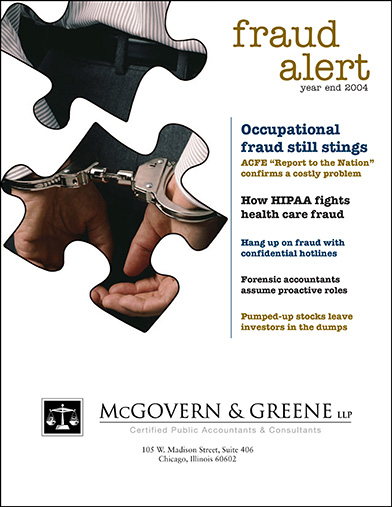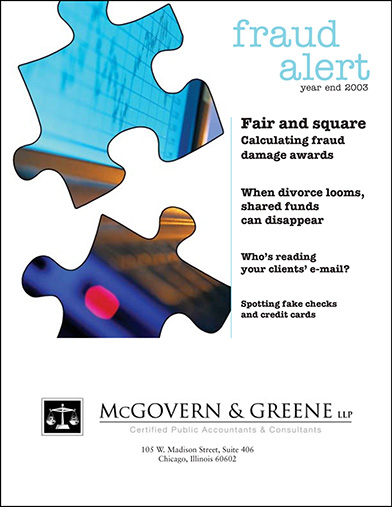Fraud Alert Magazine
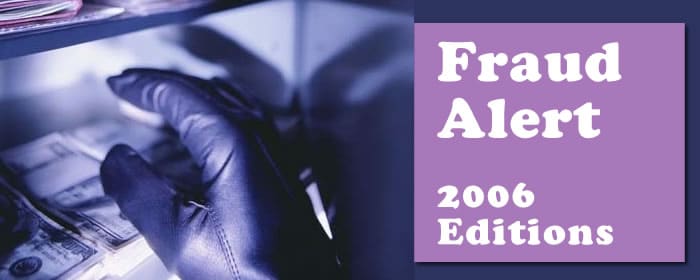
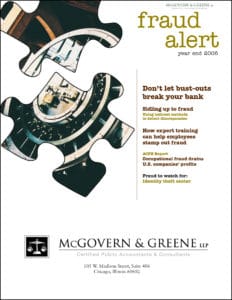 YEAR END 2006 Issue of Fraud Alert
YEAR END 2006 Issue of Fraud Alert
Don’t let bust-outs break your bank
Bust-outs aren’t new, but they’re sophisticated, well financed and increasingly popular—especially during the holiday season. This article explains how con artists set up fake corporations for the purpose of ordering goods, and not paying for them. Businesses are advised to be vigilant when checking customer credit requests and to be particularly suspicious when customers press for prompt credit approval. Other red flags include customer income statements with unusually large profits and customers with a history of successive small orders followed by a sudden large order.
Sidling up to fraud
Using indirect methods to detect discrepancies
Even when there’s no solid evidence an employee is committing fraud, a forensic accountant can use indirect methods to establish possible guilt. Using cash transaction analysis, an expert compares an individual’s known revenue sources with their use of those funds. If expenditures exceed income without a viable explanation, additional investigation may be warranted. Other indirect approaches include the net worth and expenditure methods.
How expert training can help employees stamp out fraud
Because many companies—particularly small businesses—lack the skills or knowledge to fight back, they’re enlisting the help of forensic accountants. These professionals can provide comprehensive employee training that will give workers the tools to identify fraud. Accountants can educate employees about common schemes such as payroll theft, check and credit card fraud, and fraudulent charitable solicitations.
ACFE report
Occupational fraud drains U.S. companies’ profits
This article summarizes some of the findings of the Association of Certified Fraud Examiners’ 2006 Report to the Nation on Occupational Fraud & Abuse. It includes a discussion of the major categories of occupational fraud — asset misappropriation, corruption and fraudulent statements — and identifies the types of employees most likely to commit fraudulent acts.
Fraud to watch for: Identity theft center
This short article reports on the new Center for Identity Management and Information Protection (CIMIP). Formed by an alliance of corporate, government and academic entities, CIMIP will focus its research on critical issues in identity management, information sharing and data protection.
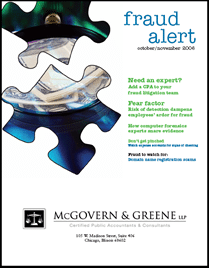 OCT/NOV 2006 Issue of Fraud Alert
OCT/NOV 2006 Issue of Fraud Alert
Need an expert?
Add a CPA to your fraud litigation team
When businesses initiate a civil suit or press criminal charges against an employee, they need every resource at their disposal. One of the most critical is the expertise of a CPA. Because CPAs understand internal controls, accounting systems and financial reports, they can help uncover the full extent of any occupational fraud. They can also help with depositions, and, once a case gets to court, serve as an expert witness. This article explains the types of assistance CPAs can provide during legal action and how best to work with these experts on a case.
Fear factor
Risk of detection dampens employees’ ardor for fraud
The fear of getting caught is one of the most powerful deterrents against fraud. This article outlines ways businesses can use the perception of detection — including ongoing fraud prevention programs, confidential tip hotlines, interviews with senior managers and periodic surprise audits — to minimize fraud in their organizations.
How computer forensics experts snare evidence
No matter how adept an employee is at hiding evidence of fraud, a knowledgeable forensics expert is likely to find a computer trail. Often, experts can access information without compromising it or even disrupting the business while it’s being retrieved. More important, these experts know how to maintain the chain of custody required to meet rules of evidence requirements.
Don’t get pinched
Watch expense accounts for signs of cheating
Even small amounts of expense account cheating can add up to a lot of money. This article explains how to spot false claims. It also suggests ways to prevent employees from claiming unauthorized expenses, including creating a detailed expense account policy and ensuring it’s reasonable and fair.
Fraud to watch for: Domain name registration scams
As this short article explains, Internet domain name scams are enjoying renewed success. The most popular types of domain name frauds and ways to avoid getting scammed are discussed.
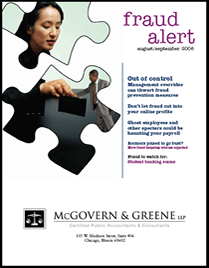 AUG/SEP 2006 Issue of Fraud Alert
AUG/SEP 2006 Issue of Fraud Alert
Out of control
Management overrides can thwart fraud prevention measure
A company may have strong fraud prevention controls in place, but what happens when senior mangers override those controls? In the worst cases, senior managers may alter records, manipulate financial results, intentionally misstate the timing of transactions or use other tactics to hide financial problems. This article highlights signs that management overrides are occurring and suggests ways to prevent this from happening, including building an ethical company culture and employing internal and external auditors.
Don’t let fraud cut into your online profits
With Internet fraud losses significant for many businesses that accept online orders, many companies are looking for ways to protect themselves. This article lists some of the more successful loss-prevention tools including address verification systems, real-time authorizations, customer follow-up and card verification codes.
Ghost employees and other specters could be haunting your payroll
“Ghost” employees — or fictitious employees invented to defraud companies — can be a big problem for small businesses without sufficient internal controls and segregation of payroll duties. This article explains some common payroll scams, and how to detect and prevent them. Prevention suggestions include outsourcing payroll processes altogether and ensuring computer systems are password-protected and access-limited.
Boomers poised to go bust?
More fraud targeting retirees expected
As baby boomers move into retirement, their combination of age and wealth is likely to make them increasingly attractive targets for fraudsters. Shady financial seminars for seniors are already surging, as are other scams involving insurance, estate planning and unregistered securities. But consumer advocacy groups and legislators are preparing for an even-bigger wave of senior-targeted fraud with awareness-raising campaigns and tougher penalties for perpetrators.
Fraud to watch for: Student banking scams
As this short article explains, some college students are being lured by scam artists into counterfeiting and check-kiting schemes. As the new school year approaches, bankers need to be certain their account verification procedures are up-to-date and in force.
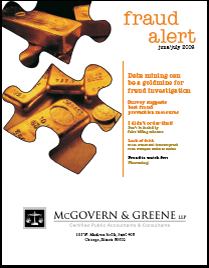 JUN/JUL 2006 Issue of Fraud Alert
JUN/JUL 2006 Issue of Fraud Alert
Data mining can be a goldmine for fraud investigation
Data mining — the process of analyzing information and finding patterns from data in large databases — has been used by the credit card industry to detect fraud for decades. Today, it’s also being used by fraud experts to prevent and uncover fraud in many types of business. It might, for example, be used to identify people who stage auto accidents to collect insurance settlements. This article explains how data mining works, its potential benefits and possible concerns about the process.
Survey suggests best fraud prevention measures
This article summarizes findings of the 2005 PricewaterhouseCoopers Global Economic Crime Survey. They include the findings that large companies are disproportionately affected by fraud and that companies using multiple layers of fraud controls detect more fraud and suffer less severe financial loss from fraud than those that rely on only one or two controls.
I didn’t order that!
Don’t be fooled by false billing schemes
False billing schemes can take a couple of different forms. False billers might persuade a business to pay for ads in a fictitious publication. Another, related scam involves fake office supply orders. An invoice may be sent for supplies or services a business received but never ordered. This article provides tips on avoiding these types of scams.
Lack of faith
When fraudulent insurers profit from wrongful denial of claims
Not only is it good business practice for insurers to cover legitimate claims, but it’s illegal for them to deny them. Unfortunately, not all insurers are good businesspeople, and some are even dishonest. They may be guilty of bad faith — wrongfully denying claims. Bad faith can cost a business significant aggravation, not to mention legal fees, and businesses are advised to deal only with reputable insurance companies, file claims promptly and document all correspondence relating to claims.
Fraud to watch for: Pharming
“Pharming” — a scam in which criminals redirect browser requests to Web pages they control — is the latest online fraud risk. This short article explains how the scheme works and how Web surfers can avoid it.
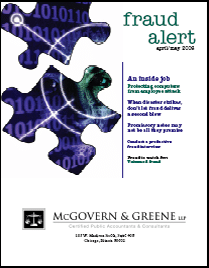 APR/MAY 2006 Issue of Fraud Alert
APR/MAY 2006 Issue of Fraud Alert
An inside job
Protecting computers from employee attack
Most businesses are aware of the dangers hackers pose to corporate e-mail accounts, Web sites and computer-based business applications. But most haven’t established sufficient protection against an even greater threat: insider abuse. Unless steps are taken to prevent abuse, employees may take advantage of gaps to establish phony accounts, siphon money, create phantom transactions or buy products for personal use. This article provides tips on preventing employee computer fraud.
When disaster strikes, don’t let fraud deliver a second blow
Business owners whose facilities have been damaged or destroyed by disaster are likely eager to get their business up and running. Unfortunately, scam artists are only too willing to help. This articles explains how to screen contractors, including asking for references, getting everything in writing and withholding final payment until the work is actually completed to owners’ satisfaction.
Promissory notes may not be all they promise
Legitimate promissory notes can be valuable both to businesses that need to raise money and to investors that buy the notes for relatively high rates of return. Fraud, however, has made this form of borrowing a risky business. This article lists the warning signs of promissory note fraud, including guaranteed or higher-than-normal investor returns, exorbitant commissions and notes being sold widely to individual investors.
Conduct a productive fraud interview
When employers suspect an employee of fraud, they’ll want to enlist the help of financial and legal advisors to handle the bulk of the investigation. Before advisors arrive, however, owners and managers may need to perform interviews to help resolve any doubts and obtain information before memories fade. This article explains how to conduct interviews that result in useful information that can help resolve doubts and bolster potential legal proceedings.
Fraud to watch for: Voicemail fraud
As this short article explains, even a seemingly innocuous voicemail system can expose businesses to fraud — and thousands of dollars in losses — if they don’t take minimal precautions. These precautions include requiring employees to create unique passwords that are changed regularly.
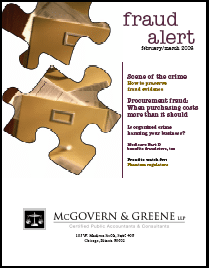 FEB/MAR 2006 Issue of Fraud Alert
FEB/MAR 2006 Issue of Fraud Alert
Scene of the crime
How to preserve fraud evidence
The first action a business should take when it discovers fraudulent activity is to preserve evidence. Without evidence, fraud can’t be prosecuted and punished, so it’s important to gather as much as possible, as quickly as possible, while preserving a proper chain of evidence. Paper documents should be handled by a limited number of people to prevent tampering. Computer evidence should be gathered by IT specialists trained in computer forensics.
Procurement fraud: When purchasing costs more than it should
Procurement fraud is pervasive in businesses, whether by fraudulent vendors, a company’s own staff, or both. When this type of fraud involves cash payments to employees it can be difficult to detect. But owners can look for signs that include consistent supply shortages, informal communication between purchasing staff and vendors and poor record-keeping. To prevent procurement fraud, companies can develop a code of ethics, set up a fraud hotline and regularly perform purchasing audits.
Is organized crime harming your business?
Organized crime has a long history of infiltrating legitimate businesses to control unions, employee benefit plans and contract allocation. Shady benefits service providers are particularly alarming because they can cause substantial financial losses by affecting multiple plans. Companies should be suspicious of plan administrators who are evasive or can’t easily answer questions. Consulting trusted financial advisors and notifying law enforcement can help businesses avoid becoming victims.
Medicare Part D benefits fraudsters, too
Medicare Part D represents a major change in benefits that are available for Medicare and Medicaid patients. But these new benefits also represent an opportunity for con artists. Employers can protect themselves and retired employees by making staff available to properly explain the plan and refer retirees to government information sources.
Fraud to watch for: Phantom Regulators
In a new twist on an old scam, fraudsters are posing as securities regulators to persuade investors to buy worthless securities or pay “transaction taxes.” This short article provides a list of signs that someone posing as a regulator isn’t legitimate.
This publication is distributed with the understanding that the author, publisher and distributor are not rendering legal, accounting or other professional advice or opinions on specific facts or matters, and, accordingly, assume no liability whatsoever in connection with its use.
GFAS Fraud Alert Archives
Expert Forensic Accounting Services
Chicago | Las Vegas
FORENSIC ACCOUNTING
SERVICES
Insurance Claims
Accounting Investigations
Mergers & Acquisitions
Due Diligence Reviews
Dispute Advisory Services
Special Examinations
Contract Audits and Recoveries
LITIGATION SERVICES
Expert Witness Testimony
Commercial Damages
Shareholder/Partner Disputes
Bankruptcy and Insolvency
CPA Malpractice Claims
Contract Disputes
Estate and Trust Disputes
Data Mining & Electronic Discovery
FRAUD EXAMINATIONS

